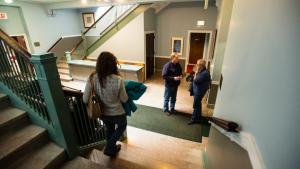This is not an easy time to be an academic. If there ever was an easy time, this is assuredly not it.
The number of students pursuing doctoral degrees continues to climb. Meanwhile, good academic jobs remain scarce and are becoming scarcer. The changing economy of the university world means that part-time, contractual work is quickly becoming the norm for academics. William Plater, writing in the July/August 2008 issue of Academe, the journal of the AAUP, describes a few relevant statistics:
- 65% of new faculty appointments are for part-time positions.
- More than half of full-time appointments are not eligible for tenure.
- The large majority of these part-time or tenure-ineligible positions are filled by people who do not have doctorates.
Thus, not only are “traditional” faculty positions rapidly disappearing, but the growing pool of nontraditional positions is open to many more applicants.
Cheerful stuff, eh? You’re thinking, “You’re reminding me of exactly the wrong thing. I’ve got debts to pay and a family to feed, and this is not what I want to hear. I need some encouragement!”
Don’t get me wrong: there are many of you reading this who will enjoy the traditional academic career. Shortly after completing your doctorate, you will find a full-time tenure-track position at a prestigious research university or liberal arts college, work for six or seven years towards building your portfolio, and earn tenure, leading to a long and productive academic career. Many of you will also find fulfillment and happiness in nontraditional academic settings. There’s something that you need to know, however, regardless of whether your academic career develops smoothly or roughly.
If you pin your sense of worth to your academic career, then your frustration is inevitable.
Academic Jeopardy
The academic world likes to pretend that it’s a meritocracy, that the cream will rise to the top, that hard work, initiative, and talent are always rewarded. It does work that way, much of the time. No one ever became a tenured professor because they were lazy and incompetent. But the academy is also like the game show Jeopardy! Not too surprising, since academics often do well on the show, which rewards trivial knowledge and a readiness to show it off. Further, in both the academy and the game show, factors outside of pure “merit” determine whether or not you make the cut.
A few years ago, I auditioned for Jeopardy! Having scored high enough on the online test, I was invited to try out in person. My father-in-law drove me to a swanky hotel in downtown Indianapolis, where I and about forty other potential contestants met in a small conference room, with a replica of the famous game board positioned up front. We were given another test and then brought up in groups of three to play a short mock round and answer Alex Trebek-style personal questions based on our applications – “How did you become interested in beekeeping?” “I see here that you once shared a cab with Steven Spielberg” – to see how well we would come across on camera.
The producers were honest with us. Yes, you had to be smart to get on the show. You could not fake your way to success on Jeopardy! Being smart, though, was not enough. You also had to be somewhat camera-friendly, with a good smile and pleasant personality. The producers told us that they wanted contestants that the audience could identify with and root for. And there were other, unstated qualifications. For example, I learned from Jeopardy! insiders that women make up only about 10% of the people who take and pass the initial test. The show, however, aims for a 50/50 balance of women and men. You can do the math.
At my tryout, there were a few people who simply knew everything. There was no clue too trivial for them. Their personalities, however, could have used some work. They avoided eye contact and gave answers to personal questions that were extraordinary in their blandness, despite the best attempts of the producers. “What do you do for fun?” “Read.” “Really? What kinds of books do you like to read?” “Everything.” “Anything specific? Any favorite authors?” “No.” “I see. Well, thank you for auditioning!”
I live in a small town in northern Kentucky, just south of Cincinnati. At the audition I met a woman a couple of years younger than me, who lived in the next town over. Our houses were no more than five miles apart. She was there with her father, who knew my father-in-law, and they started talking local politics. It was nice to make a friend at the audition.
Soon, though, my pleasure at meeting her turned into concern. She was very friendly, with a terrific smile and pleasant attitude. During the personal portion of the audition, she told a truly funny and interesting story about getting a job as a tour guide at the same English castle she had written her master’s thesis on, and how no American tourist ever asked her why an American would be giving tours at an English castle. She was one of those people that you immediately liked. Maybe I was slightly better at answering trivia (maybe), but she wouldn’t have been at this audition if she couldn’t play the game.
After meeting her, I knew my chances were doomed. She was a shoe-in, and there was no way that two people from two small Kentucky towns five miles apart would appear in the same season of Jeopardy! I was right. I never got the call, and about six months later, as I turned on the TV, there she was, telling her charming stories to Alex before a live studio audience. She came in second, I think, though that may just be my memory protecting my pride.
Fortunately, I do not base my sense of worth on whether or not I do well on Jeopardy! Read through some online discussion forums based around the show, though, and you will meet a few people who just might. Some of them are happily coasting off their minor fame as five-time champions, long after the winnings have been spent and they have been forgotten by all but the most hardcore fans. Others are bitterly determined to make it onto the show one day, despite nine or even ten failed auditions, and plan their entire year around Jeopardy! try-outs. Many audition, but few are chosen.
True Calling
You might be feeling the same way about your academic career, quietly wondering how your particular interest or specialty will translate into a paying gig, or very loudly asking God to give you a clear sign you have been called to the academic life. First of all, be assured that your worries and concerns are normal. You have chosen a difficult career path, one whose competitiveness is the result of the great benefits of the academy. The old quip says academic politics are so vicious because the stakes are so small, but you and I know the stakes are anything but small. As a scholar, you have the opportunity to pursue truth, goodness, and beauty to an extent that few others do. You will get to teach and study subject areas that you love and to influence generations of students. You are at the center of the cultivation and creation of culture. (For more on the culture making, see Andy Crouch’s book by that title.) The academy is far from the only worthwhile vocation, but it’s a darn good one.
Even more importantly, be comforted and encouraged by your true calling, which is most assuredly not to the academy. Or to business, or homemaking, or to any place or career at all, but to a person.
In his book The Call, Os Guinness distinguishes between primary and secondary callings.
Our primary calling as followers of Christ is by him, to him, and for him. First and foremost we are called to Someone (God), not to something (such as motherhood, politics, or teaching) or to somewhere (such as the inner city or Outer Mongolia).
Our secondary calling, considering who God is as sovereign, is that everyone, everywhere, and in everything should think, speak, live, and act entirely for him. We can therefore properly say as a matter of secondary calling that we are called to homemaking or to the practice of law or to art history. But these and other things are always the secondary, never the primary calling. They are “callings” rather than the “calling.” They are our personal answer to God’s address, our response to God’s summons. Secondary callings matter, but only because the primary calling matters most. (The Call, p. 31)
Like game show auditions, there are many factors which can limit or even halt an academic career. I won’t list them, so as not to inflame your imagination. In our calling to Christ, however, there is no limit, either in our devotion or in the results. I pray that each of you will flourish in your academic calling, that your research, teaching, and service will be fruitful and recognized for excellence, and that your academic calling will integrate well with your multiple other callings. Even more, I pray that one day you will hear these words from the one who calls us all:
“Well done, good and faithful servant! You have been faithful with a few things; I will put you in charge of many things. Come and share your master’s happiness!” (Matthew 25:21).
For more thoughts about academic calling visit the ESN resource page on Calling & Vocation and the ESN blog posts on calling/vocation.



